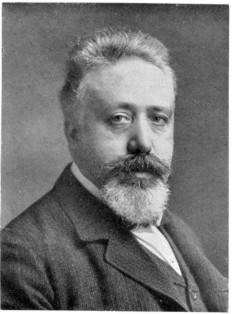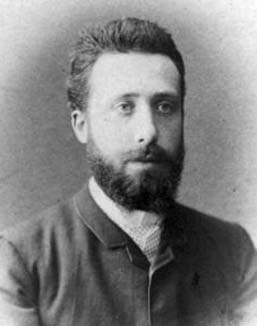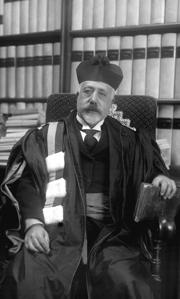<Back to Index>
- Mathematician Vito Volterra, 1860
- Dramatist August Friedrich Ferdinand von Kotzebue, 1761
- King of Sweden and Norway Charles XV and IV, 1826
PAGE SPONSOR



Vito Volterra (3 May 1860 – 11 October 1940) was an Italian mathematician and physicist, known for his contributions to mathematical biology and integral equations.
Born in Ancona, then part of the Papal States, into a very poor Jewish family, Volterra showed early promise in mathematics before attending the University of Pisa, where he fell under the influence of Enrico Betti, and where he became professor of rational mechanics in 1883. He immediately started work developing his theory of functionals which led to his interest and later contributions in integral and integro-differential equations. His work is summarised in his book Theory of functionals and of Integral and Integro-Differential Equations (1930).
In 1892, he became professor of mechanics at the University of Turin and then, in 1900, professor of mathematical physics at the University of Rome La Sapienza. Volterra had grown up during the final stages of the Risorgimento when the Papal States were finally annexed by Italy and, like his mentor Betti, he was an enthusiastic patriot, being named by the king Victor Emmanuel III as a senator of the Kingdom of Italy in 1905. In the same year, he began to develop the theory of dislocations in crystals that was later to become important in the understanding of the behaviour of ductile materials. On the outbreak of World War I, already well into his 50s, he joined the Italian Army and worked on the development of airships under Giulio Douhet. He originated the idea of using inert helium rather than flammable hydrogen and made use of his leadership abilities in organising its manufacture.
After World War I, Volterra turned his attention to the application of his mathematical ideas to biology, principally reiterating and developing the work of Pierre François Verhulst. The most famous outcome of this period is the Lotka–Volterra equations.
In 1922, he joined the opposition to the Fascist regime of Benito Mussolini and in 1931 he was one of only 12 out of 1,250 professors who refused to take a mandatory oath of loyalty. His political philosophy can be seen from a postcard he sent in the 1930s, on which he wrote what can be seen as an epitaph for Mussolini’s Italy: Empires die, but Euclid’s theorems keep their youth forever. However, Volterra was no radical firebrand; he might have been equally appalled if the leftist opposition to Mussolini had come to power, since he was a lifelong royalist and nationalist. As a result of his refusal to sign the oath of allegiance to the fascist government he was compelled to resign his university post and his membership of scientific academies, and, during the following years, he lived largely abroad, returning to Rome just before his death.